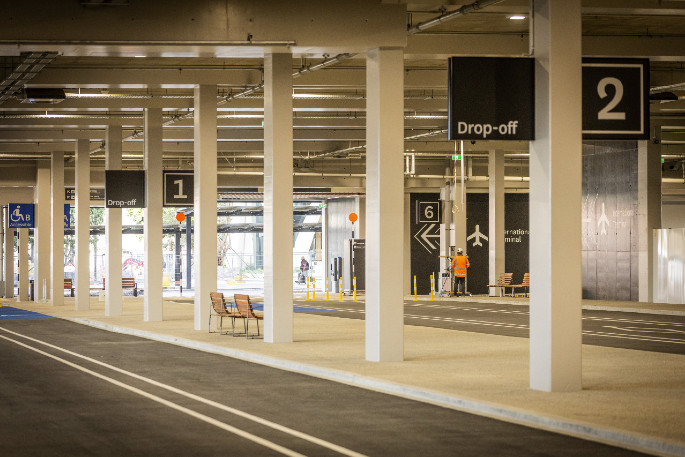This Content Is Only For Subscribers
Auckland Airport’s international terminal transport system is set for the biggest change in its nearly 50-year history with the opening of the Transport Hub ground floor on Wednesday, April 3.
From 2am that morning, travellers heading for the international terminal will be the first to experience the brand-new facility when they pull up to more than 320m of new undercover kerbside drop off and pick up – a 200 per cent boost in space on what’s currently available out front of the terminal. Construction continues with parking levels above opening late-2024.
Replacing the old 1977 international terminal ground-level car park, the ground floor of the Transport Hub covers more than 14,000m2 with separate lanes for public and commercial traffic creating an efficient and modern arrival and departure experience for those using public transport and scheduled buses, being dropped off or picked up by friends and family, or being dropped off by taxis, rideshares and shuttles.
Directly alongside the Transport Hub, new office spaces for the airport’s operational teams and partner organisations are under construction, designed to a 5-Star Green rating. A 1.2-megawatt rooftop solar array will help power the office building and the EV charging available in the car park.
Auckland Airport chief executive Carrie Hurihanganui says the Transport Hub creates an easier, efficient and more welcoming arrival and departure point for international travellers, and in the future, domestic customers of the new integrated domestic terminal.
“The drop-off and pick-up lanes, designed to handle the 650 vehicles an hour expected at peak, are an important step towards a new integrated domestic terminal. This is creating the capacity to manage future vehicle volumes with allowance for future mass rapid transit right alongside.”
Around the Transport Hub, pedestrian walkways and landscaping showcasing native planting, including mature pōhutukawa re-located from the surrounding construction sites, creates spaces with a unique feel of Aotearoa New Zealand. Five 25,000 litre rainwater tanks will provide non-potable water for the office and Transport Hub, plus irrigation for planted areas.
“We’re thrilled to be opening the first stage less than two years after starting work on the site. This was the first of our major infrastructure projects to get underway once the borders reopened. Post-pandemic there was a window of opportunity while international travel was rebuilding to complete a project of this scale while minimising disruption.
“We do recognise that car parking was less convenient for a period, so we thank people for their patience and understanding during the Transport Hub construction. We reckon the ease and convenience the Transport Hub delivers will be absolutely worth it.”
1970s Inner terminal road closes for business
The opening of the Transport Hub brings the closure of the drop off and pick up area that’s operated directly out front of the international terminal.
As Auckland Airport works towards starting on the new domestic terminal proper, there is an extensive programme of projects – enabling works – to prepare the airport for a successful build.
“The upgrade of our terminal front door is one which will be most noticeable to anyone coming to the international terminal,” says Carrie.
“We’ll be closing the inner terminal road in front of the terminal building to make way for a raft of upgrades that will support the new domestic terminal to be integrated into the international terminal.
“We will also eventually reinstate the two-lane inner terminal road prioritising public transport at the front door of the terminal. This will further increase public drop-off/pick-up capacity in the Transport Hub.
“A feature of the design allows for wide covered footpaths to create room for families and travellers with luggage, pedestrian crossings, plenty of seats, and lighting, as well as calling time on the large sails that have adorned the terminal since the early 90s as we create a more modern look to our front door.
“Below ground, we need to prepare the airport for the next 50 years of operation by making sure the vital utilities backbone – water, stormwater, sewage, power, telecommunications, and the like – are fit-for-purpose. Over the years utilities have kept pace with traveller growth but meeting the needs of the new domestic terminal and ensuring future resilience requires a major upgrade to these vital, albeit hidden, connections,” says Carrie.
Work on the road, utilities and area directly in front of the terminal will take place over the next two years. Pedestrian access will be maintained throughout through controlled crossings at departures and arrivals.



